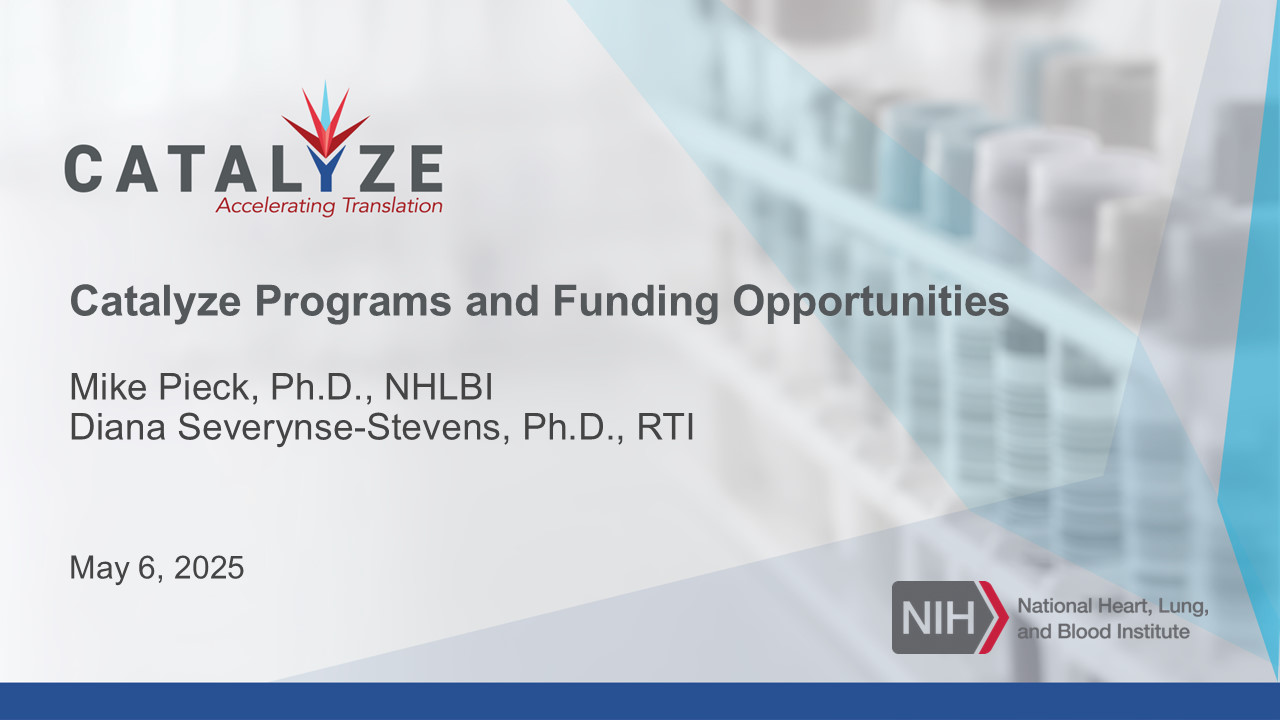| Technology Type |
Enabling Technologies & Transformative Platforms |
Therapeutics |
Therapeutics |
Devices/Diagnostics/Tools |
Devices/Diagnostics/Tools |
| FOA Name |
Catalyze: Enabling Technologies and Transformative Platforms for HLBS Research |
Catalyze: Product Definition for Small Molecules, Biologics and Combination Products - Target Identification and Validation, and Preliminary Product/Lead Series Identification |
Catalyze: Product Definition for Small Molecules, Biologics, and Combination Products - Preliminary Product/Lead Series Identification and Combination Product Prototype |
Catalyze: Product Definition – Medical Device prototype design/testing and disease target identification and assay development |
Catalyze: Product Definition – Medical Device Prototype Optimization |
|
(R33 - Clinical Trials Not Allowed) |
(R61/R33 – Clinical Trials Not Allowed) |
(R33 - Clinical Trial Not Allowed) |
(R61/R33 - Clinical Trial Not Allowed) |
(R33 - Clinical Trial Not Allowed) |
| Budget amounts |
Application budgets must not exceed $350,000 direct costs per year. |
Application budgets must not exceed direct costs of $400,000 per year during the R61 phase and also must not exceed direct costs of $400,000 per year during the R33 phase. The total budget (Federal award and non-Federal matching contributions) should reflect the actual needs of the overall proposed project. Annual project budgets should reflect the actual costs anticipated in each year. |
Application budgets must not exceed direct costs of $400,000 per year. The total budget (Federal award and non-Federal matching contributions) should reflect the actual needs of the overall proposed project. Annual project budgets should reflect the actual costs anticipated in each year. |
Application budgets must not exceed direct costs of $300,000 per year during the R61 phase and also must not exceed direct costs of $300,000 per year during the R33 phase. The total budget (Federal award and non-Federal matching contributions) should reflect the actual needs of the overall proposed project. Annual project budgets should reflect the actual costs anticipated in each year. |
Application budgets must not exceed direct costs of $300,000 per year. The total budget (Federal award and non-Federal matching contributions) should reflect the actual needs of the overall proposed project. Annual project budgets should reflect the actual costs anticipated in each year. |
| Cost sharing expectations |
No cost sharing required |
For the R33 portion of this award, the recipient is expected to provide at least a 0.25:1 non-Federal match of the Federal direct costs requested. |
The recipient is expected to provide at least a 0.25:1 non-Federal match of the Federal direct costs requested. |
For the R33 portion of this award, the recipient is expected to provide at least a 0.25:1 non-Federal match of the Federal direct costs requested. |
The recipient is expected to provide at least a 0.25:1 non-Federal match of the Federal direct costs requested. |
| Letter of support for cost sharing funds |
No cost sharing required |
Required to transition from R61 to R33 phase |
Required at time of application |
Required to transition from R61 to R33 |
Required at time of application |
| Special Requirements |
Requires description of the milestones, timeline and project management plan including identification of team member to serve as project manager. In addition, within the Research Strategy Section applicants must include a subsection to describe performance measures.
Also requires one page attachment describing potential impact. |
For both phases, requires description of milestones, timeline, performance measures, and project management plan including identification of a team member to serve as project manager.
Progressing to R33 phase requires identification of at least one Accelerator Partner, provision of evidence of cost match, and continued development of IP and regulatory strategies. |
Requires description of milestones, timeline, performance measures, and project management plan including identification of a team member to serve as project manager. Contains cost matching component. Requires identification of at least one Accelerator Partner.
Requires a separate attachment describing preliminary IP and regulatory plans. |
Requires description of milestones, timeline, performance measures, and project management plan including identification of a team member to serve as project manager.
Progressing to R33 phase requires identification of at least one Accelerator Partner, provision of evidence of cost match, and continued development of IP and regulatory strategies. |
Requires description of milestones, timeline, performance measures, and project management plan including identification of a team member to serve as project manager. Contains cost match component. Requires at least one Accelerator Partner.
Requires a separate attachment describing preliminary IP and regulatory plans. |
